Introduction
The Importance of Continuous Learning Habits in today’s rapidly changing world, continuous learning is not just an advantage but a necessity. The pace of technological advancements and the dynamic nature of the job market demand that individuals constantly update their skills and knowledge. This essay explores the importance of continuous learning habits, the benefits they offer, strategies to cultivate these habits, and the challenges faced in maintaining lifelong learning.
The Importance of Continuous Learning
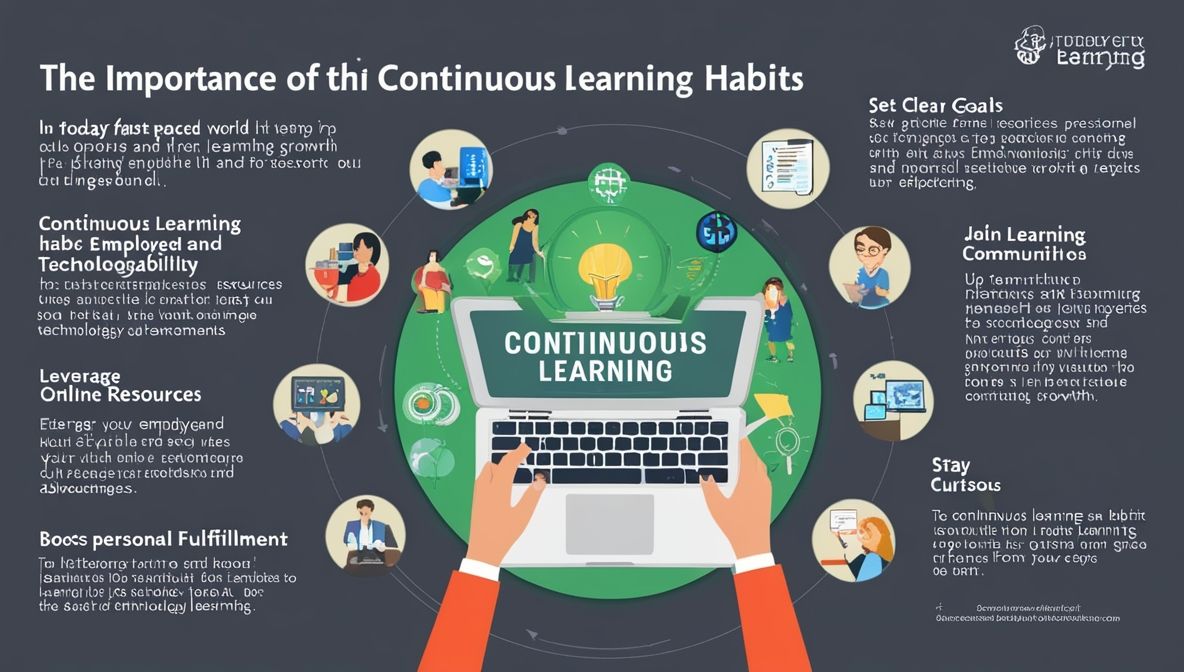
Continuous learning refers to the ongoing process of acquiring new knowledge and skills throughout one’s life. This concept has become increasingly important due to several factors:
- Technological Advancements: The rise of new technologies such as artificial intelligence, machine learning, and automation is transforming industries. Professionals must stay abreast of these changes to remain relevant and competitive in their fields.
- Job Market Dynamics: The modern job market is highly dynamic, with new roles emerging and traditional ones evolving. Continuous learning enables individuals to adapt to these changes and seize new opportunities.
- Globalization: The interconnectedness of the global economy means that professionals often need to understand diverse cultures, languages, and business practices. Continuous learning helps individuals develop a global perspective.
- Personal Development: Beyond professional growth, continuous learning enriches personal life by broadening perspectives, enhancing critical thinking, and fostering creativity.
Benefits of Continuous Learning
- Enhanced Employability: Continuous learning equips individuals with up-to-date skills, making them more attractive to employers. It also opens doors to career advancement and higher earning potential.
- Adaptability: In a world where change is the only constant, the ability to learn and adapt quickly is invaluable. Continuous learners are better prepared to handle shifts in their careers and industries.
- Improved Cognitive Function: Engaging in lifelong learning has been shown to improve cognitive function and delay the onset of cognitive decline. It keeps the brain active and engaged.
- Increased Confidence: Mastering new skills and knowledge boosts self-confidence. Continuous learners are more likely to take on challenges and pursue their goals with determination.
- Personal Fulfillment: Learning new things brings a sense of achievement and fulfillment. It keeps life interesting and adds to the richness of personal experiences.
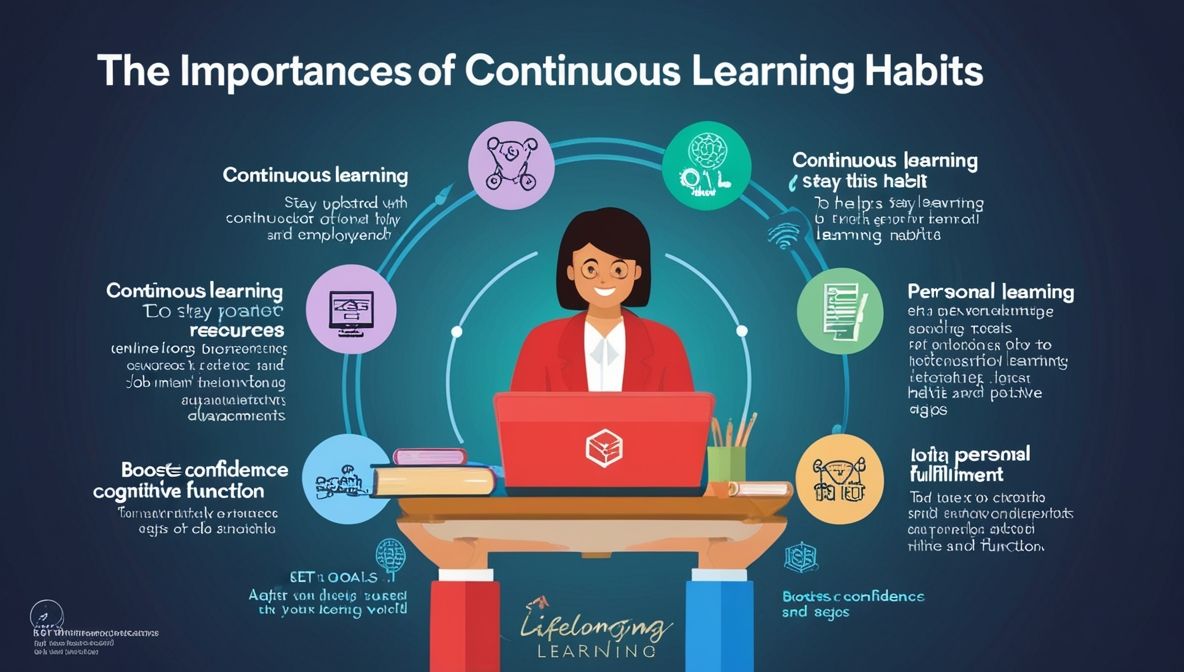
Strategies for Cultivating Continuous Learning Habits
- Set Clear Goals: Identify what you want to learn and why. Clear goals provide direction and motivation. Break down larger goals into smaller, manageable tasks to maintain progress.
- Create a Learning Schedule: Allocate specific times for learning activities. Consistency is key to developing a habit. Even dedicating 15-30 minutes a day to learning can make a significant difference over time.
- Leverage Online Resources: The internet offers a wealth of resources for continuous learning. Online courses, webinars, podcasts, and educational videos are easily accessible and often free or affordable.
- Join Learning Communities: Engage with like-minded individuals who share your learning interests. Learning communities, whether online or offline, provide support, motivation, and opportunities for collaboration.
- Stay Curious: Cultivate a mindset of curiosity. Ask questions, seek out new experiences, and be open to learning from different sources. Curiosity drives the desire to explore and learn continuously.
- Reflect and Apply: Reflect on what you have learned and find ways to apply it in real-life situations. Practical application reinforces learning and makes it more relevant and meaningful.
- Embrace Failure: Understand that failure is a part of the learning process. Embrace mistakes as opportunities for growth and learning. This mindset reduces fear of failure and encourages experimentation.
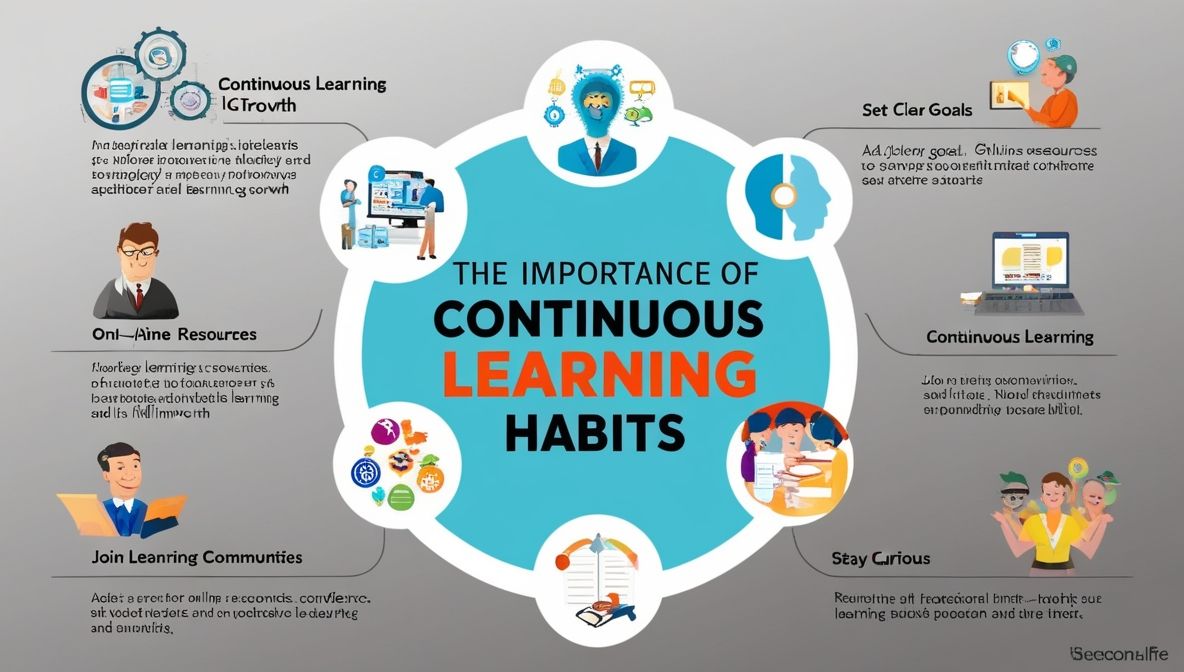
Challenges in Maintaining Continuous Learning
- Time Constraints: Balancing work, family, and other responsibilities can make it challenging to find time for continuous learning. Effective time management and prioritization are essential.
- Information Overload: The sheer volume of information available can be overwhelming. It’s important to filter out irrelevant information and focus on quality sources that align with your learning goals.
- Motivation: Maintaining motivation over the long term can be difficult. Setting achievable milestones, rewarding progress, and staying connected with learning communities can help sustain motivation.
- Resource Limitations: Access to quality learning resources can be a barrier, especially for those in remote or underserved areas. Leveraging free online resources and community libraries can mitigate this challenge.
- Learning Style Mismatch: Different individuals have different learning styles. Finding the right methods and tools that suit your learning style is crucial for effective learning.
Case Studies of Successful Continuous Learners
- Elon Musk: The CEO of Tesla and SpaceX is known for his insatiable curiosity and commitment to learning. Musk is largely self-taught in areas such as rocket science and artificial intelligence, continuously reading books and engaging with experts to expand his knowledge.
- Oprah Winfrey: A lifelong advocate of continuous learning, Oprah has often spoken about the importance of reading and self-improvement. Her book club has encouraged millions to read and learn, and she consistently pursues new knowledge through interviews and personal study.
- Bill Gates: The co-founder of Microsoft is a voracious reader, reportedly reading about 50 books a year. Gates attributes much of his success to his dedication to learning and staying informed about global issues, technology, and innovation.
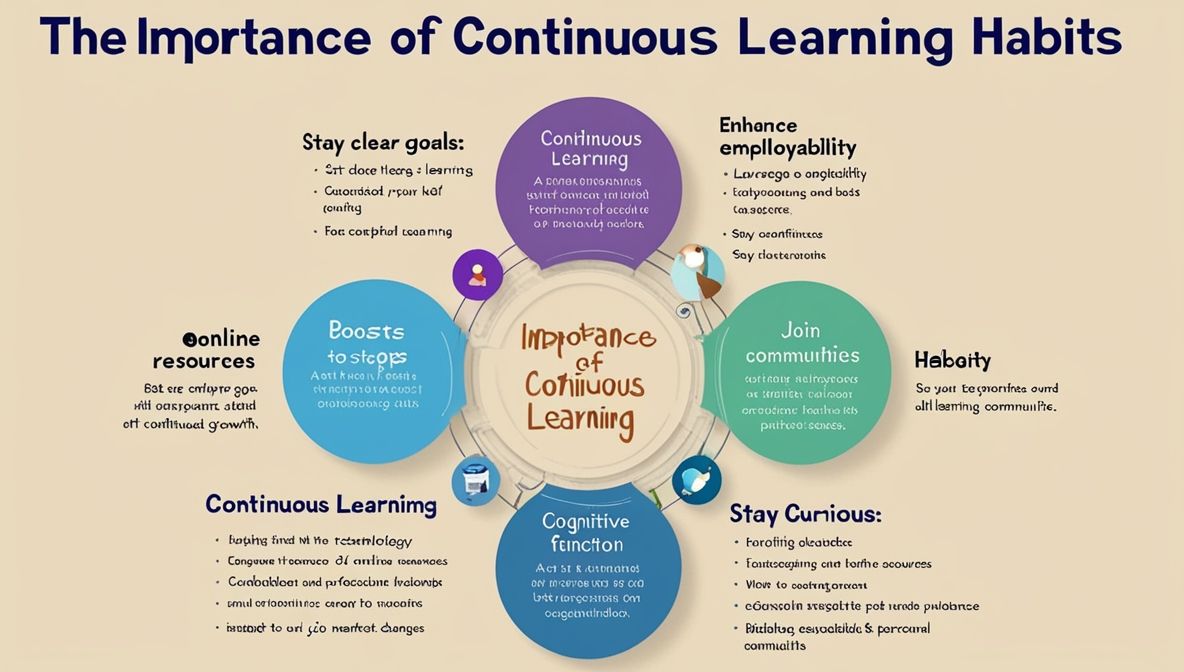
The Role of Organizations in Promoting Continuous Learning
Organizations play a crucial role in fostering a culture of continuous learning among their employees. By providing resources, support, and incentives, companies can encourage their workforce to engage in lifelong learning. Here are some strategies organizations can adopt:
- Provide Access to Learning Resources: Offer employees access to online courses, workshops, and seminars. Subscription services to platforms like Coursera, LinkedIn Learning, and Udemy can be valuable resources.
- Encourage Professional Development: Support employees in pursuing professional certifications and attending industry conferences. This not only enhances their skills but also keeps them updated with industry trends.
- Create a Learning Culture: Promote a culture where learning is valued and encouraged. Recognize and reward employees who actively engage in continuous learning. Encourage knowledge sharing through internal seminars and mentorship programs.
- Flexible Work Arrangements: Provide flexible work schedules that allow employees to dedicate time to learning. This could include options for part-time work, remote work, or dedicated learning days.
- Leadership Support: Leaders should model continuous learning by engaging in their own learning journeys. When employees see leaders prioritizing learning, it sets a positive example and reinforces the importance of continuous development.
Conclusion
Continuous learning is a vital habit for personal and professional growth in today’s fast-paced world. It enhances employability, adaptability, cognitive function, confidence, and personal fulfillment. Cultivating continuous learning habits requires setting clear goals, creating a learning schedule, leveraging online resources, joining learning communities, staying curious, reflecting on and applying knowledge, and embracing failure. Despite challenges such as time constraints, information overload, motivation, resource limitations, and learning style mismatches, the benefits of continuous learning far outweigh the difficulties.
Successful continuous learners like Elon Musk, Oprah Winfrey, and Bill Gates demonstrate the power of lifelong learning. Organizations also play a significant role in promoting continuous learning by providing resources, encouraging professional development, creating a learning culture, offering flexible work arrangements, and ensuring leadership support.
Ultimately, the pursuit of continuous learning enriches our lives, enabling us to adapt to changes, seize new opportunities, and achieve personal and professional fulfillment. By committing to lifelong learning, we can navigate the complexities of the modern world with confidence and resilience.
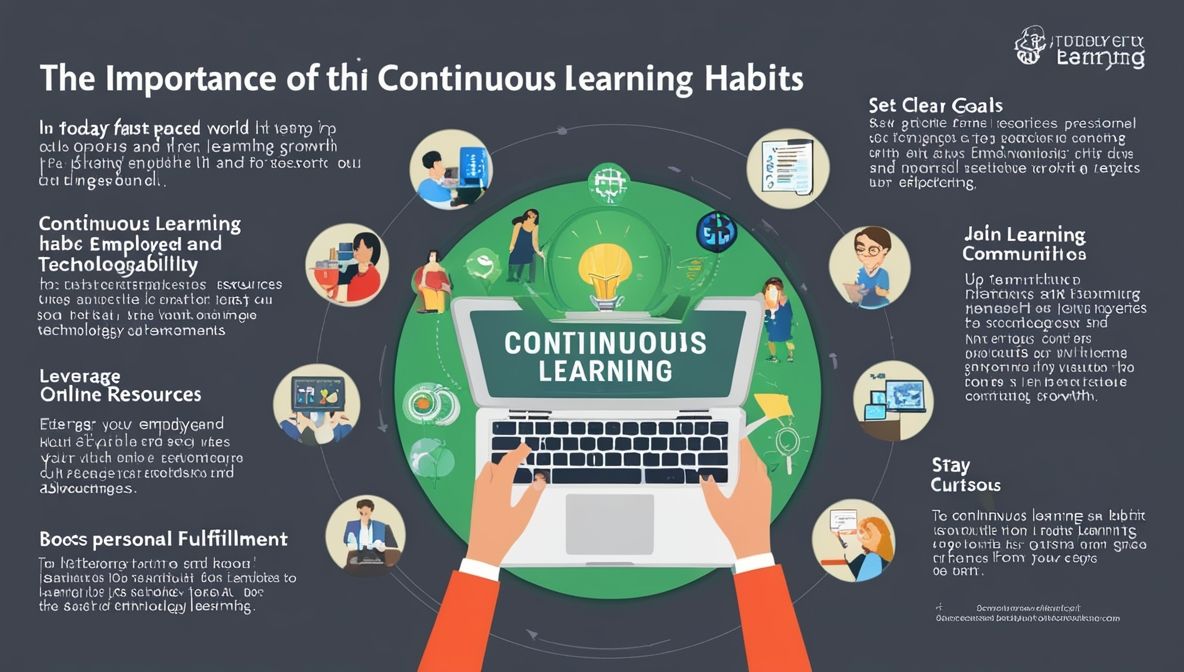
t7iz7g
hgo6ze
My brother suggested I might like this blog. He was entirely right. This post truly made my day. You can not believe simply how much time I had spent for this info! Thank you!
Temukan peluang menang besar di Shark Bounty : Slot Online Gacor yang Menjanjikan
I truly value your piece of work, Great post.
Very nice post. I just stumbled upon your blog and wished to say that I’ve truly enjoyed surfing around your weblog posts. In any case I will be subscribing for your feed and I’m hoping you write once more very soon!
I¦ll right away clutch your rss as I can’t to find your e-mail subscription hyperlink or newsletter service. Do you have any? Please let me recognise so that I may subscribe. Thanks.
Keep functioning ,terrific job!
I discovered your blog site on google and check a few of your early posts. Continue to keep up the very good operate. I just additional up your RSS feed to my MSN News Reader. Seeking forward to reading more from you later on!…
I¦ve been exploring for a little for any high-quality articles or blog posts on this kind of area . Exploring in Yahoo I ultimately stumbled upon this web site. Studying this information So i¦m satisfied to show that I have an incredibly just right uncanny feeling I came upon just what I needed. I most no doubt will make sure to don¦t overlook this web site and give it a glance on a continuing basis.
I dugg some of you post as I thought they were very helpful handy
I’d perpetually want to be update on new posts on this web site, saved to favorites! .
I genuinely enjoy reading through on this site, it has got superb articles. “Beware lest in your anxiety to avoid war you obtain a master.” by Demosthenes.
Needed to draft you a bit of note just to give many thanks yet again for these gorgeous strategies you’ve provided on this site. This is really open-handed with people like you to make extensively exactly what a number of people could have made available for an ebook to make some money for themselves, notably considering that you could possibly have done it if you ever desired. These secrets as well acted like the easy way to recognize that other people online have similar desire similar to mine to know the truth more and more with regards to this condition. I’m certain there are a lot more enjoyable opportunities ahead for folks who read carefully your website.
This design is spectacular! You obviously know how to keep a reader amused. Between your wit and your videos, I was almost moved to start my own blog (well, almost…HaHa!) Fantastic job. I really enjoyed what you had to say, and more than that, how you presented it. Too cool!
**mind vault**
mind vault is a premium cognitive support formula created for adults 45+. It’s thoughtfully designed to help maintain clear thinking
**sugarmute**
sugarmute is a science-guided nutritional supplement created to help maintain balanced blood sugar while supporting steady energy and mental clarity.
**glpro**
glpro is a natural dietary supplement designed to promote balanced blood sugar levels and curb sugar cravings.
**synaptigen**
synaptigen is a next-generation brain support supplement that blends natural nootropics, adaptogens
**breathe**
breathe is a plant-powered tincture crafted to promote lung performance and enhance your breathing quality.
**prostabliss**
prostabliss is a carefully developed dietary formula aimed at nurturing prostate vitality and improving urinary comfort.
**potent stream**
potent stream is engineered to promote prostate well-being by counteracting the residue that can build up from hard-water minerals within the urinary tract.
**revitag**
revitag is a daily skin-support formula created to promote a healthy complexion and visibly diminish the appearance of skin tags.
Youre so cool! I dont suppose Ive learn something like this before. So nice to seek out somebody with some unique thoughts on this subject. realy thanks for starting this up. this website is one thing that is wanted on the internet, somebody with a bit of originality. helpful job for bringing one thing new to the internet!
Hey There. I found your blog using msn. This is an extremely well written article. I will make sure to bookmark it and come back to read more of your useful info. Thanks for the post. I will definitely return.